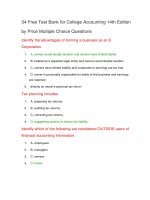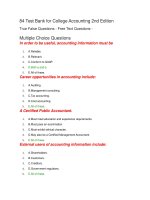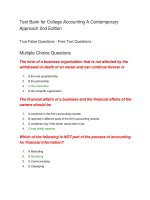TEST BANK COLLEGE ACCOUNTING CHAPTERS 1 27 22ND EDITION HEINTZ test a ch03 sol final
Bạn đang xem bản rút gọn của tài liệu. Xem và tải ngay bản đầy đủ của tài liệu tại đây (45.15 KB, 4 trang )
Name
Date
Chapter 3, TEST A
_________________________
_________________________
SCORING RECORD
Section
Total Possible
A
B
C
D
Total
30
30
10
30
100
Deductions
Student Score
Section A
Directions: Each of the following statements is true or false. Indicate your choice by writing in the
Answers column T for a true answer or F for a false answer. (2 points for each correct answer)
Answers
For
Scoring
One business transaction has a single-entry effect upon the accounting
elements; two business transactions together have a dual-entry effect on
accounting elements.
__F__
_____
2.
A T account has three parts: the title, the debit side, and the credit side.
__T__
_____
3.
To credit an account is to enter an amount on the right side of the account.
__T__
_____
4.
For every account, the total dollar amount on the credit side is called the
balance.
__F__
_____
5.
Debit always means decrease and credit always means increase.
__F__
_____
6.
A normal balance is the side of an account that is increased.
__T__
_____
7.
An increase in an expense decreases owner’s equity.
__T__
_____
8.
Revenues increase owner’s equity; therefore, they should always be
recorded directly on the credit side of the owner’s capital account.
__F__
_____
If a transaction has one debit, it can only have one credit.
__F__
_____
10. If Damen’s delivery fees for the month include $800 on account from
customers and $300 in cash, the revenue account increases $1,100.
__T__
_____
11. Prepaid insurance is an asset because it will provide future benefits.
__T__
_____
12. Withdrawals of cash by the owner for personal reasons decrease owner’s
equity and should be debited directly to the owner’s capital account.
__F__
_____
13. The sum of the debits must equal the sum of the credits on the trial balance.
__T__
_____
14. A trial balance is a list of accounts showing the title and the balance of each
account.
__T__
_____
15. The trial balance is a formal statement just like the income statement, the
owner’s equity statement, and the balance sheet.
__F__
_____
1.
9.
© 2017 Cengage Learning. All Rights Reserved. May not be scanned, copied or duplicated, or posted to a publicly accessible website, in whole or in part.
3-2
Section B
Directions: Complete each of the following statements by writing in the Answers column the letter of the
word or words that correctly completes each statement or answers the question. (3 points each)
1.
2.
3.
4.
5.
6.
7.
8.
9.
Answers
For
Scoring
The assets of a business may consist of a number of items, such as
(A) accounts payable; (B) cash; (C) delivery fees; (D) drawing;
(E) none of these.
__B__
_____
Totals on the debit and credit sides to determine the balance of an account
are known as (A) footings; (B) credits; (C) debits; (D) rulings;
(E) revenues.
__A__
_____
The normal balance is a debit in a (A) liability account; (B) revenue
account; (C) debt account; (D) capital account; (E) drawing account.
__E__
_____
When a loan is paid, a(n) (A) liability account is debited; (B) expense
account is debited; (C) asset account is debited; (D) revenue account is
credited; (E) drawing account is debited.
__A__
_____
Investment of cash in a business (A) increases revenue; (B) decreases
capital; (C) increases drawing; (D) increases cash; (E) decreases drawing.
__D__
_____
The financial statement prepared first is the (A) Statement of Financial
Condition; (B) Statement of Owner’s Equity; (C) Income Statement;
(D) Balance Sheet; (E) any one of these statements can be prepared first.
__C__
_____
Cash received on account affects (A) cash and accounts payable; (B) cash
and accounts receivable; (C) accounts receivable and revenue; (D) accounts
receivable and accounts payable; (E) cash and owner’s equity.
__B__
_____
Payment of office rent represents an increase in (A) revenues; (B) cash;
(C) a liability account; (D) drawing; (E) expenses.
__E__
_____
The trial balance is (A) a list of revenues showing the title and balance of
each account; (B) used as an aid in preparing the balance sheet; (C) reported
to the federal government; (D) a formal state or report; (E) all of these.
__B__
_____
__C__
_____
10. After the Statement of Owner’s Equity is prepared, which of the following
is carried over to the Balance Sheet? (A) Net Income; (B) Ending Drawing
Balance; (C) Ending Capital Balance; (D) Total Assets; (E) none of these.
© 2017 Cengage Learning. All Rights Reserved. May not be scanned, copied or duplicated, or posted to a publicly accessible website, in whole or in part.
3-3
Section C
Directions: For each account, indicate the financial statement on which it is reported. BS = Balance Sheet,
IS = Income Statement, and OE = Statement of Owner’s Equity. (1 point each)
1. Accounts Payable
__BS__
6.
Equipment
__BS__
2. Accounts Receivable
__BS__
7.
Prepaid Rent
__BS__
3. Capital
__OE/BS__
8.
Service Fees
__IS__
4. Drawing
__OE__
9.
Supplies
__BS__
5. Electricity Expense
__IS__
10.
Wages Expense
__IS__
Section D
Directions: The accounts below all have normal balances. Prepare a trial balance for Aster’s Accounting
Service as of May 31, 20--. (30 points total)
Accounts Payable
Accounts Receivable
Aster, Capital
Aster, Drawing
Cash
Computers
Office Furniture
$ 600
700
9,400
1,000
3,500
4,400
5,000
Prepaid Insurance
Rent Expense
Service Fees
Supplies
Telephone Expense
Wages Expense
$1,200
900
9,200
375
125
2,000
(Note: Order of accounts listed in the trial balance may vary.)
Aster’s Accounting Service
Trial Balance
May 31, 20-Account Title
Cash
Accounts Receivable
Supplies
Prepaid Insurance
Computers
Office Furniture
Accounts Payable
Aster, Capital
Aster, Drawing
Service Fees
Rent Expense
Telephone Expense
Wages Expense
Debit
3,500
700
375
1,200
4,400
5,000
Total
19,200
Credit
600
9,400
1,000
9,200
900
125
2,000
19,200
© 2017 Cengage Learning. All Rights Reserved. May not be scanned, copied or duplicated, or posted to a publicly accessible website, in whole or in part.









